Related Research Articles
Politics of Macau is a framework of political system, dominated by the People's Republic of China. It includes the legislature, the judiciary, the government, and a multi-party system. Executive power is exercised by the government, led by the Chief Executive.

Fernando Cheung Chiu-hung is a Hong Kong politician, the vice-chairman of the Labour Party, and a member of the Legislative Council.
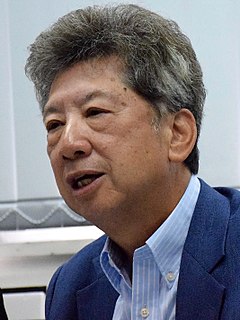
Ronny Tong Ka-wah, SC is a Hong Kong Senior Counsel and politician. He is a current non-official member of the Executive Council of Hong Kong. He co-founded the Civic Party and was a member of the Legislative Council of Hong Kong, representing the New Territories East constituency from 2004 until he quit the party and resigned from the legislature on 22 June 2015, following the historic vote on Hong Kong electoral reform a few days earlier, having switched his political alignment from pro-democracy to pro-Beijing Hong Kong political group Path of Democracy, of which he is currently the convener.

The Hong Kong 1 July protests is an annual protest rally originally held by the Civil Human Rights Front from the day of handover in 1997 on the HKSAR establishment day. However, it was not until 2003 that the march drew large public attention by opposing the legislation of Basic Law Article 23. The 2003 protest, with 500,000 marchers, was the second-largest protest seen in Hong Kong since the 1997 handover.
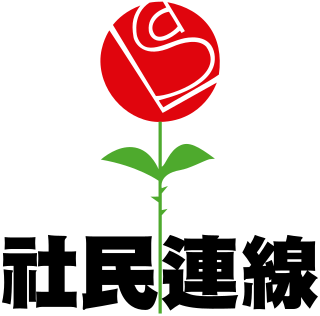
The League of Social Democrats (LSD) is a social democratic political party in Hong Kong established in 2006. Chaired by Raphael Wong, it currently holds no seat in the Legislative Council of Hong Kong after the disqualification of its sole legislator Leung Kwok-hung, the key person in the party.

Fernando Chui Sai On is a Macau politician who served as the 2nd Chief Executive of Macau from 2009 to 2019. He served as Secretary for Social and Cultural Affairs from 1999 to 2009.

Democratic and human rights have been major issues since the transfer of sovereignty to China in 1997. The one country, two systems principle allows the Hong Kong government to administer all areas of government except foreign relations and (military) defence separately from the national Chinese government. Many Hong Kong citizens became concerned about democratic development when the first Chief executive of Hong Kong Tung Chee-hwa appeared to have mishandled this issue. Other democracy-related issues involving human rights and universal suffrage became the new focal point for the pro-democracy camp. Attempts to bring Hong Kong citizens to the negotiating table by the British during the Sino-Anglo discussions were rejected by Beijing in the late 1980s. The last governor Chris Patten faced a great deal of opposition in changing the former colony's political system. However, China has been criticized for infringement of the "one country, two systems" policy.
Legislative elections were held in Macau on 20 September 2009. The official campaign began on 5 September, and several candidates received warnings from the Electoral Affairs Commission for having begun campaign activities beforehand.
The 2010 Macau transfer of sovereignty anniversary protest (2010年澳門回歸示威遊行) occurred on December 20, 2010 on the 11th anniversary of the Transfer of sovereignty of Macau. The protest took place on the same date as the handover anniversary in 1999. The protesters mainly complained about universal suffrage, housing prices and how the Macau citizens are treated worse than the pandas given to them by Beijing.
The 2013 Macanese general election took place on 15 September 2013 according to the provisions of the Basic Law of Macau. This election was the first of its kind succeeding the reform of the Legislative Assembly that created four new seats; two new geographical constituency seats and two new functional constituency seats. Out of a total of 33 seats, 14 were elected by universal suffrage under the highest averages method, while 12 were voted on from the Functional constituency, and 7 from nomination by the Chief Executive.

Occupy Central with Love and Peace was a single-purpose Hong Kong civil disobedience campaign initiated by Reverend Chu Yiu-ming, Benny Tai and Chan Kin-man on 27 March 2013. The campaign was launched on 24 September 2014, partially leading to the 2014 Hong Kong protests. According to its manifesto, the campaign advocates for an electoral system in Hong Kong that is decided through a democratic process and satisfies international standards of universal and equal suffrage. With the first three stages of the movement – dialogue, deliberation and citizens' authorization – the civil disobedience that follows must be non-violent.
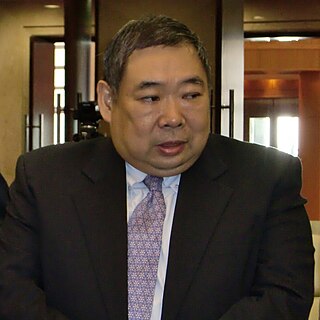
Chui Sai Cheong is a member and the First Secretary of the Legislative Assembly of Macau. He is the older brother of Fernando Chui the former Chief Executive of Macau and cousin of José Chui also a member of the Legislative Assembly.
Wealth Partaking Scheme is a cash disbursement policy to holders of a Macau Resident Identity Card by the Macau Special Administrative Region since 2008. The main purpose of the scheme is to share the results of the region's economic development with its people and help mitigate the effects of inflation.
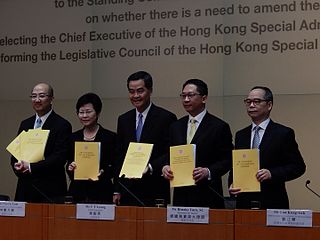
The Hong Kong electoral reform was a proposed reform for the 2017 Hong Kong Chief Executive election and 2016 Legislative Council election.

The First term of Fernando Chui Sai On as Chief Executive of Macau, officially considered part of "The 3rd term Chief Executive of Macau", relates to the period of governance of Macau since the transfer of sovereignty of Macau, between 20 December 2009 and 20 December 2014. Fernando Chui Sai On was elected in mid 2009 by 300-member Selection Committee as the second Chief Executive of Macau.

The Second term of Fernando Chui Sai On as Chief Executive of Macau, officially considered part of "The 4th term Chief Executive of Macau", relates to the period of governance of Macau since the transfer of sovereignty of Macau, between 20 December 2014 and 20 December 2019. Fernando Chui Sai On was reelected in mid 2014 by 400-member Selection Committee.
Events from the year 2009 in Macau, China.
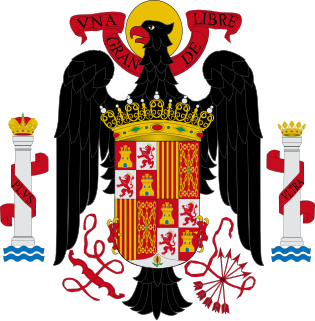
The Political Reform Act was adopted on November 18, 1976 by the Spanish Parliament with the support of 435 out of 531 members that formed the legislature, and submitted to a referendum with a participation of the 77,8% of the census and with 94,17% of the votes in favor. It had the status of Fundamental Law, being the last one of the Fundamental Laws of the Francoist State. The Act was repealed by the Spanish Constitution in 29 December 1978.
Events from the year 2018 in Macau, China.
References
- 1 2 Grace Yu (2014-07-08). "Activists pledge to organize democracy referendum on CE election". Macau Daily Times. Retrieved 2020-09-07.
- ↑ "Macau's democracy referendum: 'A new headache for Beijing'". DW. 2014-07-14. Retrieved 2020-09-07.
- ↑ "China dismisses planned Macau democracy vote as meaningless". Reuters. 2014-07-10. Retrieved 2020-09-07.
- ↑ "5 Arrested After Macau Attempts Hong Kong-Style Democracy Poll". The Wall Street Journal. 2014-08-25. Retrieved 2020-09-07.
- ↑ J.C. (2014-08-27). "Protests in Macau Chipping in". The Economist. Retrieved 2020-09-07.
- ↑ Jeffie Lam (2014-09-03). "90pc don't trust Macau leader, says 'referendum'". South China Morning Post. Retrieved 2020-09-07.
- ↑ Catarina Pinto (2014-08-01). "Flyers and flags: The referendum campaign hits the streets". Macau Daily Times. Retrieved 2020-09-07.
- 1 2 3 Catarina Pinto (2014-07-25). "Pro-democratic groups file court appeal on referendum assemblies". Macau Daily Times. Retrieved 2020-09-07.
- 1 2 João Pedro Lau (2014-07-31). "TUI refuses to rule on unnoficial referendum case". Macau Daily Times. Retrieved 2020-09-07.